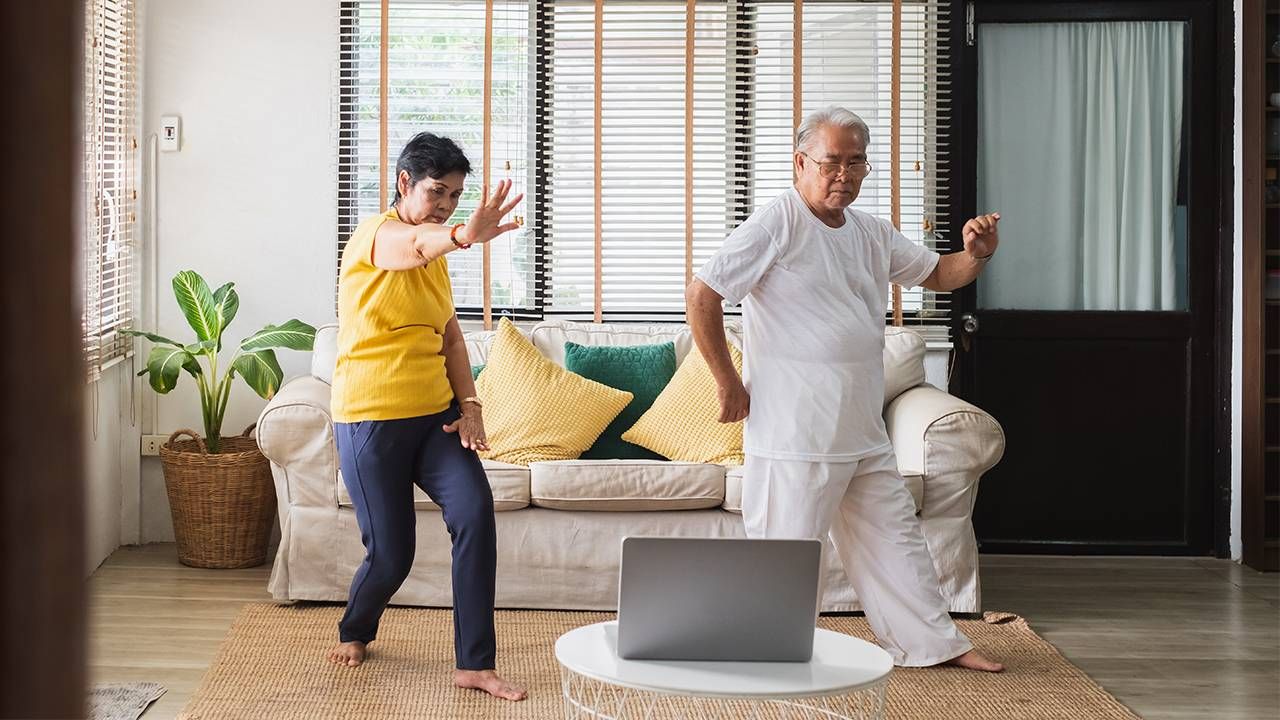9 Ways to Extend the Time You Spend Living Independently
Take these steps to stay in your home or community as long as possible
One of the biggest decisions as you age is where you will age. Three-quarters of adults in a 2018 AARP survey said they wanted to remain in their homes, but only 59% thought they would be able to do so. If remaining at home is your preference, here are nine steps you can take:

1. Prevent Falls
Falls are the most common cause of nonfatal, trauma-related hospital admissions for older adults. According to the Centers for Disease Control and Prevention, one-quarter of Americans 65 and older fall every year.
A fall can trigger a decline in functioning "which may affect your ability to remain independent," explains Liz Barlowe, aging life care manager with Barlowe & Associates in Seminole, Fla.
"Change is necessary and rather than it being forced on you, think of taking the lead."
Falls result from muscle weakness, vision problems, medication side effects, poor nutrition, chronic health conditions and unsafe home environments. The National Council on Aging has a quiz to determine if you are at risk. To prevent falls:
Talk to your doctor about weakness, dizziness or vision problems, management of chronic health conditions and medication side effects. The physician may have some helpful ideas.
Have your home evaluated by an occupational therapist for issues with lighting, tripping hazards, stairs and bathroom safety. This pro might offer practical safety suggestions.
Keep moving. "Do regular strength and balance exercises like Tai-chi," suggests Dr. Nirmala Gopalan, medical director of the geriatrics clinic at Santa Clara Valley Medical Center in San Jose, Calif. Continued mobility is essential in preventing falls. Once you fall, it's common to be fearful, but reducing your activity just makes you more prone to falls. Instead, learn how to modify your movements and environment to make activity safe.
2. Work with Experts
Switching to a geriatrician for primary care, for instance, helps preserve independence.
Geriatricians are trained to manage the complexity of multiple complicated health concerns "and know the difference between normal aging and more serious illness," says Gopalan.
"An older person's body metabolizes medications differently. Geriatricians are trained to recognize side effects and drug interactions in seniors and manage polypharmacy [the simultaneous use of multiple drugs by a single patient] safely," Gopalan says.
Move to a geriatrician "when your health is starting to impair your mental or physical well-being and the activities of daily life," advises Dr. Alicia Arbaje, associate professor of medicine at Johns Hopkins University School of Medicine in Baltimore.
"Some reasons might be: (you're) in and out of the hospital a lot, on many medications, or (having) difficulty with mobility, memory or medication," adds Arbaje, who is also chair of the American Geriatrics Society's public education committee.
Geriatric care managers are also key. They identify what you need help with and assist in finding appropriate services.
Kizzy Chambers, a professional care manager and licensed clinical social worker with RR Care Management, in Orlando, Fla., recommends "consulting with a care manager as soon as there is a concern or when a family member is feeling overwhelmed with caring for their loved ones."
For referrals, "call your local Area Agency on Aging," says Emily Greenfield, associate professor of social work at Rutgers University in New Brunswick, N.J. You can also use the federal government's Eldercare Locator.

3. Stay Mentally Active
Maintaining brain health is key and helps you remain at home.
A study in the journal Brain Imaging and Behavior showed that mentally stimulating games and activities preserved cognitive functioning in older adults. And a Harvard Medical School study showed that thinking skills, which decrease with age, can be sharpened with brain games.
"Think of your brain like a muscle. You need to alter your exercise programs to ensure you are utilizing different muscles to develop your body," says Barlowe.
To keep your brain in peak condition, Arbaje recommends a healthy diet including fruits and vegetables.
Gopalan says daily physical activity, fresh air and sunlight "are very stimulating to the brain" and that the key is always to "focus on enjoyment and not achievement."
4. Access Support Services
To remain at home, "it is important for people to feel independent and self-sufficient," says Arbaje. To do that, "be open to the idea of outsourcing services," recommends Barlowe.
Getting groceries delivered can help. If you feel intimidated by apps and online platforms, Instacart offers dedicated "senior support specialists" who help customers order by phone. Caregivers can arrange delivery of restaurant meals via DoorDash or Uber Eats, or frozen premade meals through services such as Freshly. Meals on Wheels is also an option.
Amazon has an automatic shipping option where family members can place needed items for their loved ones on a monthly auto-ship schedule. "Many of the managed care Medicare insurance plans [Medicare Advantage] allow insured individuals to order medical and nonmedical supplies, such as gloves, over-the-counter medications and adult briefs," says Chambers. Most drugstores also deliver.
For patients who need nursing home-level care, PACE programs (Programs of All-Inclusive Care for the Elderly) provide in-home service such as occupational therapy, physical therapy, meals, lab services, transportation to medical appointments and more.
State Area Agencies on Aging can connect older residents with in-home services such as chore assistance and meal delivery.
5. Discuss Medical Care Reductions
It sounds counterintuitive to reduce medical care as you age, but "we often rely too much on too many health care providers, tests and procedures," says Arbaje. "These have complications, especially medications."

Cutting back is "not a refusal of care — rather an evaluation of the burdens versus the benefits of specific care," says Dr. Tracy English, a nurse practitioner at Long Life Care Management in McDonough, Ga.
For example, the American Medical Association recommends against routine colonoscopies for patients over age 75 because of the risks involved. Some studies show statins (prescribed for high cholesterol) can have more side effects and fewer benefits for older adults. Benzodiazepines (used for anxiety, depression and seizures) can cause memory issues in older patients.
Barlow advises taking time to consider what your physician is ordering or recommending. "Discuss with your doctor how you feel about your care as you age and what is important to you – independence, optimal functioning and quality of life," she says.
Arbaje suggests older adults "revisit the risks and benefits (of treatments) often, as these change over time."
6. Maintain Relationships
Social and family connections support mental health, such as the ability to manage stress and prevent depression. Tam Perry, associate professor of social work at Wayne State University in Detroit, suggests older adults find ways to both give and receive support. "Helping other people can be just as important and sometimes even more, for our well-being," she says.
Family relationships are key to managing the challenges of remaining at home. A joint report by the National Alliance for Caregiving and AARP found that 89% of caregivers for older adults are family members.
7. Stay Flexible
"Change is necessary and rather than it being forced on you, think of taking the lead," says Barlowe. "Keep your eye on your goal of living independently and be open to possibilities that will help you."
A study in Cell Press found aging causes the brain to become less adaptive to change. Older people can become resistant to things like taking new medications or making home modifications. (A separate study found that noncompliance with medication led to 23% of all nursing home admissions.)
Studies also show home modifications allow older adults to maintain their level of activity for at least two years. So, remaining open to these is key.
Additionally, Barlowe points out, "I have met more people that out of vanity refuse a walker but will walk through their home holding onto furniture because they are so unsteady. The use of a supportive device may allow you to safely remain independent."
8. Start Saving Money
Remaining at home can be expensive. "[In-home] caregiving expenses are very high and a significant factor to be able to continue to stay at home when someone becomes dependent with multiple medical conditions," says Gopalan.
Rates for nonmedical aides (for things like housework, meals and errands) range from $16 to $28 per hour depending on where you live. Home health care aides may cost up to $30 per hour.
Staying in your own home requires thinking ahead.
Home modifications can range from inexpensive changes (railings or flashing doorbells) to major expenses such as stair lifts. Medicare does not cover home modifications. Medicaid may provide some coverage, but each state's program is different.
Start saving for these costs now. "Older people who have paid off a mortgage and invested in adaptations to minimize effects of disability are best off," says Stephen Albert, professor at University of Pittsburgh School of Public Health and editor of the journal Innovation in Aging.
9. Have a Plan
Staying in your own home requires thinking ahead. If you have chronic conditions, talk with your doctor to understand how the disease could progress, so you can anticipate how to manage it in the future.
Plan for how you will get help when needed. "Personal emergency response (PER) systems [also called medical alert systems] are effective and efficient, says Chambers. "PERs allow for quicker response time by first responders and for medical attention to be provided," she adds.
Arbaje says the most important thing is to talk to family "about what you would want if you were to get sick — who will take care of you, who will take care of the pets and who will take care of your spouse."

